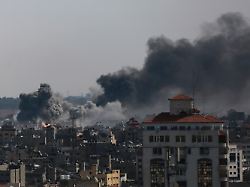When the ground offensive comes
Israelis fear they will have to pay a “high price”.
From Tal Leder, Metulla
October 21, 2023, 7:11 p.m
Many Israelis expect the army to launch a ground offensive against Hamas. An ex-soldier who was himself involved in urban warfare says: “I fear the worst is yet to come.” A former general warns against an occupation of the Gaza Strip.
It was June 1982 when Israeli forces invaded Lebanon to put an end to ongoing cross-border terrorist attacks. Although Operation Peace for Galilee drove out the Palestine Liberation Organization, the war led to a protracted conflict and, above all, highlighted the risks of a ground offensive. It was not until May 2000 that Israel withdrew again. During the last few armed conflicts, the country was rather hesitant when it came to a ground offensive. Both the second Lebanon war in 2006 and the Gaza war in 2014 were fought with great losses.
“The situation is different this time,” says Avi Sasson, a former tour guide from Metulla, near the Lebanese border. “Israel will take decisive action against Hamas. We will pay a high price. There is also a risk of a two-front war.” The 66-year-old fought as an infantry soldier in Lebanon 30 years ago and was involved in house-to-house fighting in the densely populated urban area of Beirut. As a civilian, he demonstrated for withdrawal from the Cedar State.
“You won’t be able to defeat the enemy from the air,” he explains. He expects a ground offensive: “Israeli forces will face a hellish thicket of densely packed buildings, mines and tunnels as they hunt down Hamas mingling with the civilian population. It is a precarious situation that will cause immense human suffering and others could draw countries into it. I fear the worst is yet to come.”
Many Israelis believe the upcoming operations could be among the most significant in Israel’s history. The likely objectives include the destruction of all remaining Hamas and Palestinian Islamic Jihad rockets, as well as all their tunnels, ammunition depots, weapons workshops and command infrastructure. To make this possible, the armed forces will probably have to occupy the entire Gaza Strip this time and kill or capture as many terrorists or their leaders as possible. Above all, they have to free the hostages alive.
Ex-general wants prisoner exchange
In order to save the lives of the hostages, ex-general and army ombudsman Yitzhak Brick spoke out in favor of a prisoner exchange on Israeli Channel 12 on Thursday. “We still have the opportunity to get them alive. Israel should release the 6,000 terrorists demanded by Hamas from prisons in Gaza. It is better if they live in their tunnels instead of in our prisons. If they were actively involved in terrorism, they would even be legal target.”
The security expert explains the difficulty of eliminating a movement with a base as significant as Hamas. To avoid civilian casualties, Israel should not launch a hasty ground offensive but should first dry out Hamas’s logistics. “The terrorists know that Israel will invade and have prepared for a guerrilla war.” Although Brick calls for the overthrow of Hamas, he warns against the reoccupation of the coastal strip. “Cleaning up the defended sites would cause costly losses,” he says. “The presence of the Israeli army in certain areas – with barracks and border crossings – would create another problem. Soldiers would become prime targets for surviving terrorists hiding among the civilian population.”
Experts expect that it will not just be an invasion of the Gaza Strip, but also a clash with Hezbollah in the north. There is also the risk of a regional conflict that could extend far beyond the Middle East. This could be part of Iran’s encirclement strategy. The Shiite allies in Iraq and Yemen, supported by Tehran, warned that if the USA intervened directly in Gaza, American targets in the region could be attacked. Already on Thursday, pro-Iranian militias fired rockets from Yemen that may have targeted Israel. A US warship intercepted them in the Red Sea.
“Tehran relies on its proxies”
“The likelihood of direct Iranian military involvement is unlikely,” says Raz Zimmt of the Institute for National Security Studies in Tel Aviv. “Tehran relies on its proxies, although it has recently shown a willingness to conduct direct offensive operations against Israel from Syria.”
According to the Middle East expert, Jerusalem could use the current situation to launch a preemptive strike against Hezbollah in order to reshape the situation in Gaza and Lebanon. This would put Iran in a quandary because Tehran’s renunciation of active participation could allow Israel to fatally strike Hamas. “The mullahs’ regime is facing a dilemma,” says Zimmt. “Hezbollah’s entry into an all-out war with Israel could threaten the capabilities of its most important strategic ally. “The longer and harder the conflict becomes, the greater the likelihood that Tehran could make a decision that could lead to further regional escalation .”
The Iranian shadow war with Israel is already entering a new phase. Tehran, through its proxies such as Hezbollah, has hit the Jewish state hard. It has also brought the Palestinian issue back onto the international agenda and disrupted normalization efforts between Israel and Saudi Arabia.
“The Jewish people are fighting for their survival”
“This could be a long conflict,” believes Avi Sasson from Metulla in northern Israel. “The ground offensive is imminent. Of course, ordinary people have to be protected, but are the NATO countries interested in the Russian civilian population through their arms deliveries to Ukraine?”
The former tour guide fears that Israel could be forced to take direct action against Iran. Its nuclear ambitions are a danger to the Jewish state. “Iran’s state doctrine includes the destruction of Israel,” says Sasson. “The Jewish people are fighting for their survival. It will be our new war of independence.”
